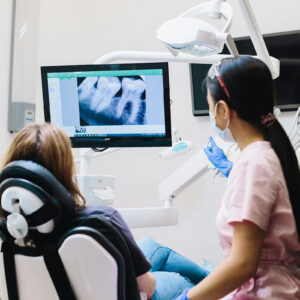[et_pb_section fb_built=”1″ _builder_version=”4.16″ global_colors_info=”{}”][et_pb_row _builder_version=”4.16″ background_size=”initial” background_position=”top_left” background_repeat=”repeat” global_colors_info=”{}”][et_pb_column type=”4_4″ _builder_version=”4.16″ custom_padding=”|||” global_colors_info=”{}” custom_padding__hover=”|||”][et_pb_text _builder_version=”4.16″ background_size=”initial” background_position=”top_left” background_repeat=”repeat” global_colors_info=”{}”]
Root canals are common dental procedures but many people are unaware of the potential risks they carry. Biological Dentistry has observed that these treatments might be a source of chronic infection, leading to wider systemic health problems.
Mostly, this issue stems from the tooth essentially being dead but still kept in the mouth. An infection from a dead organ can result in severe medical complications, and a ‘dead’ tooth isn’t exempted from such outcomes. Despite having the root cleaned out and nerve endings trimmed to avoid pain, the hidden problem lies within bacteria-filled microtubules present in them which are often left behind.
These microtubules are laced with toxic waste material coming from bacteria which get circulated through your bloodstream, potentially impacting your overall health. Since the tooth doesn’t transmit pain after a root canal procedure, you might not realize a festering infection deep inside, raising concerns over the safety of this treatment.
Sometimes, the option might lie in extracting a root canaled tooth but this process needs to be carried out with care. For example, the extracted area should be well-treated with ozone gas. This gas can permeate the bone and gum tissue to disinfect the area, eliminating the risk of infection takeover.
Moreover, the removal of the periodontal ligament is also needed to allow for jawbone regrowth and sealing the hole completely. If these steps are overlooked, a bacteria-filled pocket may form in your jawbone.
Dental replacement can be considered only once the jawbone has completely healed, estimated to take a minimum of three months. Various replacement methods can be utilized like inserting a removable bridge, traditional bridge, an implant-supported bridge, or a resin-bonded bridge.
In the world of Biological Dentistry, inserting a zirconia implant is the most preferred solution because of its biocompatibility and non-metallic composition. While traditional implants involve titanium, which can cause autoimmune issues or enhance galvanic currents in your mouth, zirconia implants exhibits no such side effects.
Root canals don’t necessarily eradicate infections, instead may heighten the risk of chronic health problems. Therefore, understanding these risks is imperative. The International Academy of Biological Dentistry and Medicine encompasses dentists who specialize in safer, holistic dental procedures to protect your complete well-being.
The International Academy of Biological Dentistry and Medicine (IABDM) is a network of dentists, physicians, and health professionals committed to promoting biological dentistry. Visit us online to learn how our health practitioners are promoting optimal health through the use of non-toxic dental materials.
[/et_pb_text][/et_pb_column][/et_pb_row][/et_pb_section]
